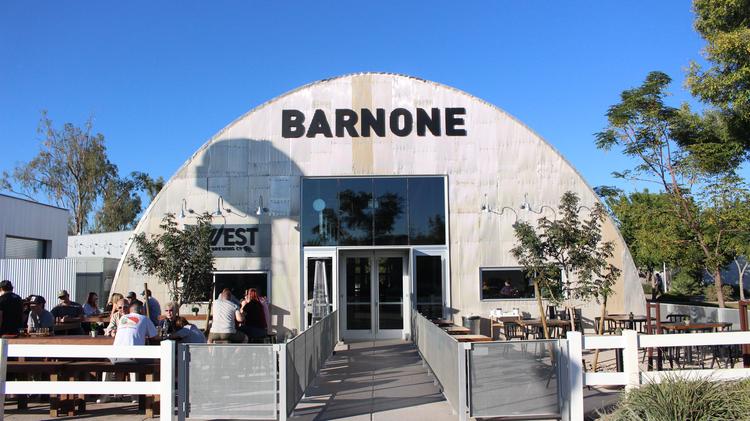Original Article via Phoenix Business Journal
The retail industry has been undergoing a sea change: The rise of e-commerce and consumer preferences have brought big boxes and chain giants such as The Limited and Macy’s (NYSE: M) to their knees.
But in lieu of that, small business retailers have found niches to thrive, and one of the shining examples of that is Barnone in Gilbert.
Community
Barnone, near Higley and Ray roads, is the latest addition to the Johnston family’s Agritopia, the farm-community brought to life by Joe Johnston, the man behind some of the Southeast Valley’s most well-known restaurants such as Joe’s Farm Grill and Joe’s Real BBQ.
The space hosts 12 small business owners, many of whom are running their own businesses for the first time. Each tenant has a space ranging from 250 to 1,000 square feet in Barnone, which was originally a 1950s barn transformed by architect Jack Debartolo.
Just about every tenant — which ranges from wood printing to machinery to a winery — has some relation to the Johnston family, direct or otherwise.
Joe Johnston’s nephew Mark Johnston runs Prickly Pear Paper; his son is the owner of Fire & Brimstone pizzeria; his brother Steve Johnston owns Johnston Arms; Brandon Young, the co-owner of wood design business Letter Craft, used to serve Johnston’s son William margaritas at Rancho de Tia Rosa; Matt and Shelley Miera, co-owners of Wander salon, were regulars at Liberty Market, where William is a co-owner; Brian Ruffentine, co-owner of Garage East winery, lives at Agritopia; and Mirelle Helm, owner of Everybody Loves Flowers, was William’s high school art teacher.
“I wouldn’t have done this with anyone else,” Helm said of Joe Johnston and his family. “Everything he touches turns to gold.”
That sense of community comes easy to a place such as Barnone and Agritopia, and it’s something that national retailers, restaurants and hotels have been trying to tap into.
Craftsmen and craftswomen
Barnone’s tagline is “a craftsmen community,” where, according to William Johnston, Agritopia and Johnston Family Co.’s business manager, the intention behind opening the space was to “see people making things with their hands.”
Handmade and unique items have surged in the recent years, taking up some of the space left by shuttered retailers. It’s what has helped to make sites such as Pinterest so popular, as well as Amazon’s introduction of its “Handmade” section on its website.
“There’s always been a backlash against generic and mass-produced goods,” Sean Slater, principal at Chicago-based Retail Design Collective, told the Phoenix Business Journal earlier this month. “What we’re seeing right now is because of e-commerce, consolidation and consumer trends, baby boomers and millennials are not acquiring things anymore, they’re not making a lot of purchases. That’s hollowing out the market, so when people shop, they want to buy something that has instant history. They want to know the maker.”
Johnston Machine Co. is perhaps the best example of this: the space is simply a place where things are built, not where people shop. But the things the space creates range from tea pressers to pool drains to tortilla rollers for midtown restaurant Gadzooks.
“They can make anything you can think of,” said William Johnston.
The philosophy behind Barnone has led to some of the tenants — such as Everybody Loves Flowers — to host classes, showing people how to do what they do.
Collaboration
Post-recession, one of the biggest takeaways for small businesses is that they could no longer look at each as competitors, but as collaborators.
“The small business environment was comfortable doing their own thing,” Rick Murray, former CEO of the Arizona Small Business Association, said of the pre-recession era. “Then we saw that melt away before our eyes. We have all come to realize that we can’t operate in a silo, and that our individual success is everyone’s success.” …




